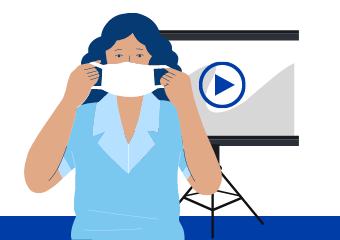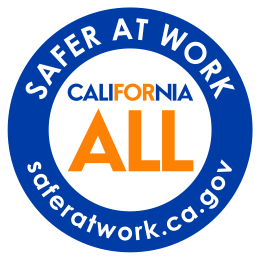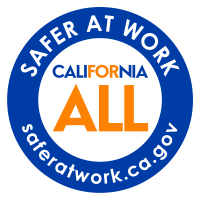COVID-19 Workplace Requirements Employers Need to Know


As the pandemic presents new challenges in health and the workplace, employers must take steps to protect their workers and business from COVID-19. Use the resources available here to learn about COVID-19 workplace requirements such as safety procedures, training for employees on infection prevention, and what to do in case of an infection or outbreak.
I want to have a safer and healthier workplace
A worker may be sick or exposed to COVID-19
COVID-19 Prevention Non-Emergency Regulations
Training & Resources
COVID-19 Vaccines in the Workplace
Who to Contact
Independent Contractor / Worker Misclassification
Wildfire Smoke and Heat Illness
Vaccines in the workplace
May an employer require its employees to be vaccinated against COVID-19?
Under the Fair Employment and Housing Act (FEHA), an employer may require employees to receive an FDA-approved vaccination against COVID-19 infection so long as the employer does not discriminate against or harass employees or job applicants on the basis of a protected characteristic, provides reasonable accommodations related to disability or sincerely-held religious beliefs or practices, and does not retaliate against anyone for engaging in protected activity (such as requesting a reasonable accommodation).
Department of Fair Employment and Housing Information on COVID-19 regarding Vaccinations
May a business require customers to show proof of vaccination against COVID-19 and/or proof of a recent negative COVID-19 test before permitting entry into the business?
Yes, the Unruh Civil Rights Act permits businesses to implement rules that protect employees and customers from COVID-19 infection. Please note that the business can’t ask only certain type of customers to show proof of vaccination and/or a recent negative COVID-19 test if it’s done so based on a personal characteristic protected by the Unruh Civil Rights Act. Please consult DFEH’s Guidance regarding COVID-19 safety measures and reasonable accommodations for important information about reasonable accommodations as well.
Is an employer required to compensate a worker for the time spent obtaining a COVID-19 test or vaccination?
If the employer requires an employee to obtain a COVID-19 test or vaccination (see Department of Fair Employment and Housing FAQs for guidance on the types of COVID-19 tests an employer may require and on vaccination), then the employer must pay for the time it takes for the testing or vaccination, including travel time.
The employer must pay for the time it takes for testing or vaccination because such time would constitute “hours worked.” The term “hours worked” means the time during which a worker is subject to the control of an employer, and includes all the time the worker is suffered or permitted to work, whether or not required to do so. Under this definition, one way to determine whether time a worker spends performing a task must be paid as time worked is whether the employer exercised control over the worker by requiring the worker to perform that task. If an employer requires that a worker obtain a medical test or vaccination, the time associated with completing the medical test or vaccination, including any time traveling and waiting for the test or vaccination to be performed, would constitute time worked. However, unless otherwise required, the time spent waiting for COVID-19 test results is not compensable as hours worked, although the worker may be able to utilize paid leave while waiting for the results.
An employer cannot require the worker to utilize paid leave if the time is considered “hours worked” as referenced above.
If the time is not considered “hours worked,” the worker may be able to utilize the worker’s paid leave for time off from work to obtain testing or vaccination. Regular paid sick leave may be used for preventive care, which includes medical testing and vaccines, for the employee or the employee’s family members, and is protected against retaliation under the Labor Code.
Are employees allowed to know if their coworkers have not been vaccinated?
Any record of employee or applicant vaccination must be maintained as a confidential medical record.
Who is eligible for booster vaccinations?
Please see CDPH’s COVID-19 Vaccine Booster Questions and Answers for the latest list of eligible groups.
Where can I get a digital copy of my COVID-19 vaccine record?
You can now get a digital copy of your vaccination record. It’s available to you if:
- You got vaccinated in California, and
- Your information matches what is recorded in the state’s immunization systems.
To get your vaccine record:
Can I get vaccinated against COVID-19 while I am currently sick with COVID-19?
No. Wait until you have recovered and have met the criteria for ending isolation. This guidance also applies to people who get COVID-19 between their first and second dose.
For more information on COVID19 vaccines, please visit covid19.ca.gov/vaccines/
Independent Contractor / Worker Misclassification
What difference does it make if a worker is a worker rather than an independent contractor?
California’s wage and hour laws (e.g., minimum wage, overtime, meal periods and rest breaks, etc.), workplace safety laws, and retaliation laws protect workers, but not independent contractors. Additionally, workers can go to state agencies such as the Labor Commissioner’s Office to seek enforcement of these laws, whereas independent contractors must resolve their disputes or enforce their rights under their contracts through other means.
For more information on the difference between a worker and an independent contractor, please visit DIR’s independent contractor FAQ’s
Are there penalties for misclassifying workers as independent contractors?
Yes. Employers would face wage violation penalties for misclassifying a worker as an independent contractor and civil penalties for willful misclassification. Willful misclassification is defined as voluntarily and knowingly misclassifying a worker as an independent contractor.
For more information on the difference between a worker and an independent contractor, please visit DIR’s independent contractor FAQ’s
Wildfire Smoke and Heat Illness
There is wildfire smoke in the area and I have workers who are working outdoors and asking me for respirators. Am I required to provide them respirators and train workers on how to safely use them?
When the Air Quality Index (AQI) is 151 or greater, but does not exceed 500, employers must provide a sufficient number of respirators (mask that reduces exposure to aerosol droplets) to all workers for voluntary use and encourage workers to use respirators. If workers are complaining about smoke at lower AQI levels it is suggested that you to provide respirators upon request. Employers must also train workers on wildfire smoke hazards, the protections available, and how to use respirators.
For more information on handling wildfire hazards, please review DIR’s wildfire hazards FAQ’s
My workers work in an office building nearby wildfires, how can I determine if the air is safe to breathe?
If the building has a central ventilation system that filters the incoming air, windows and other openings are kept closed, and the doors are kept closed except for when it’s necessary for people to enter or exit, the air quality should be safe. If there are still concerns with the air quality, portable air cleaners can provide additional protection. Follow the manufacturer’s instructions and use air cleaners that are certified by the California Air Resources Board.
For more information on handling wildfire hazards, please review DIR’s wildfire hazards FAQ’s
Is an employer required to provide N95 masks to workers?
Employers are required to provide respiratory protection if the working conditions include harmful exposures. When responding to wildfire smoke, providing masks might be required depending on the current air quality.
Employers also need to have a written respiratory protection program.
More information on when to provide masks and the written respiratory protection program is available at DIR’s N95 mask FAQs.
Where can I check and obtain the current Air Quality Index (AQI) and AQI forecasts?
You can check and obtain the current AQI and AQI forecasts for PM2.5 from the following web sources:
What should be done if a worker starts to get sick from the heat?
Employers must have a plan that describes what to do if a workers shows signs or symptoms of heat illness, including who will be contacted for medical help. The employer must also provide training on steps to take in case of an emergency, including appropriate first aid procedures for heat illness; and how to give clear and precise directions to the work site if a call to 911 is needed. Workers are not responsible for any medical or ambulance costs related to workplace illness or injuries.
For more information on Wildfire Hazards, please review Cal/OSHA’s FAQ’s on 99Calor.
Do workers get an extra break to prevent heat illness?
In addition to regular breaks, workers have the right to a minimum 5-minute cool down rest in the shade at any time during the shift, and employers have an obligation to tell workers that they have these rights without retaliation.
When temperatures reach or exceed 95 degrees, agricultural employers must ensure workers take a minimum ten-minute cool-down rest every two hours.
An additional ten-minute cool-down rest at the end of the 8th and 10th hours of work is also required.
For more information on heat illness, please review Cal/OSHA’s FAQ’s on 99Calor.
Training and resources
COVID-19 training for California workers
Online courses are available for workers and employers to take on-demand. Take a course to learn more about COVID-19 and preventing the spread in the workplace.
Learn from our partners


A variety of free trainings for employers, workers, and unions are being offered by the Labor Occupational Health Program at UC Berkeley.

A list of resources for workers and communities impacted by COVID-19 is provided by the UCLA Labor Occupational Safety and Health Program.

COIVD-19 resources specific to helping agricultural employers and farmworkers are available from the Western Center for Agricultural Health and Safety at UC Davis.
Who to contact
Occupational Safety and Health (Cal/OSHA)
You can file a workplace safety and health complaint with Cal/OSHA online, or by telephone at the district office closest to you.
Cal/OSHA has launched a call center to help workers with questions specifically related to COVID-19.
The Cal/OSHA call center number is: 833-579-0927
Workers' Compensation
For questions on workers' compensation, call 1-800-736-7401 for recorded information on workers' compensation benefits from Information and Assistance staff 24 hours a day, or contact a local Division of Workers' Compensation office during business hours to reach a live person
Labor Commissioner's Office
For questions on paid sick leave, retaliation protections, filing a wage claim, or retaliation complaint:
(833) LCO-INFO (833-526-4636)
To leave a tip about an employer that is not paying workers that take sick leave:
(855) LCO-SPSL (855-526-7775)


